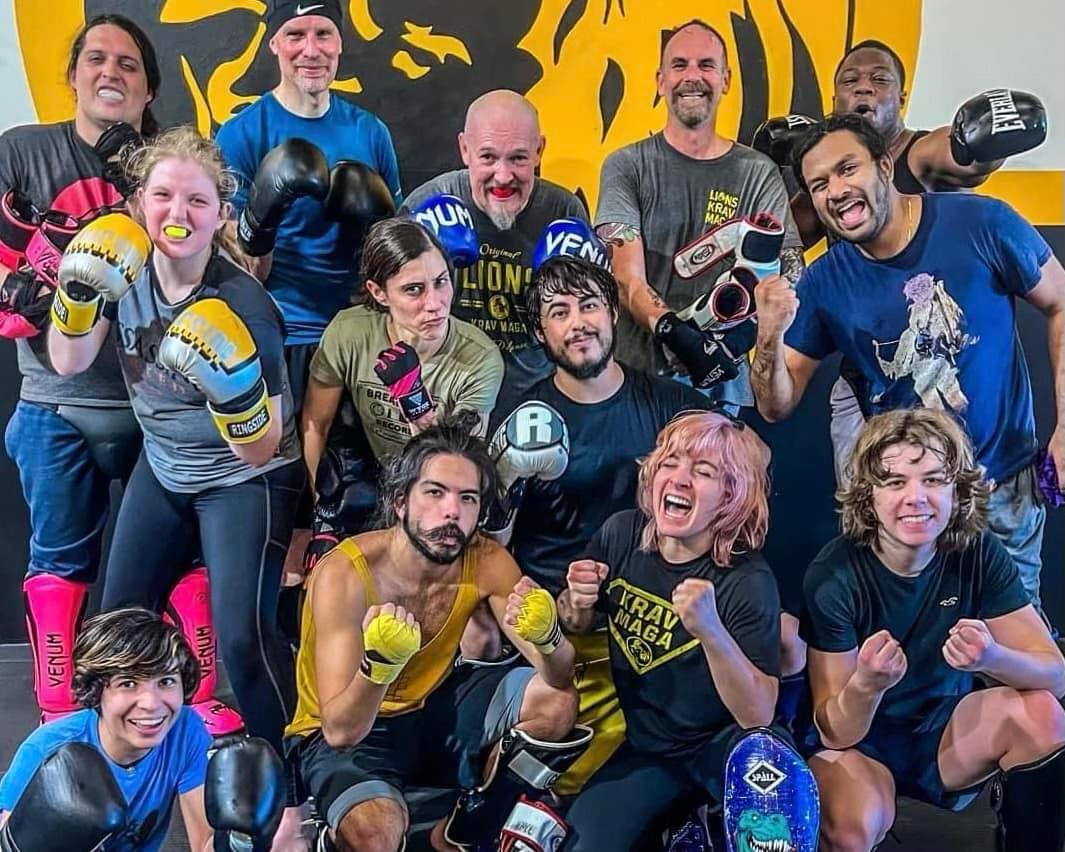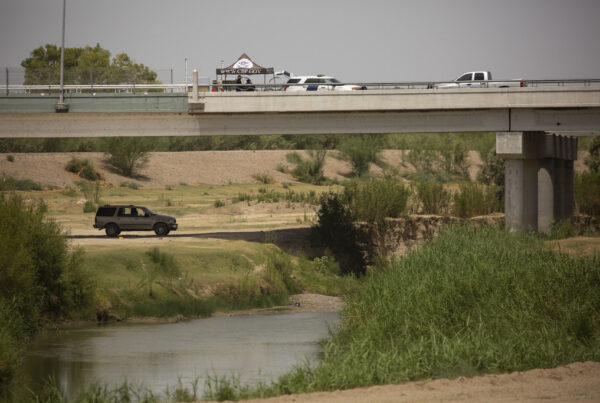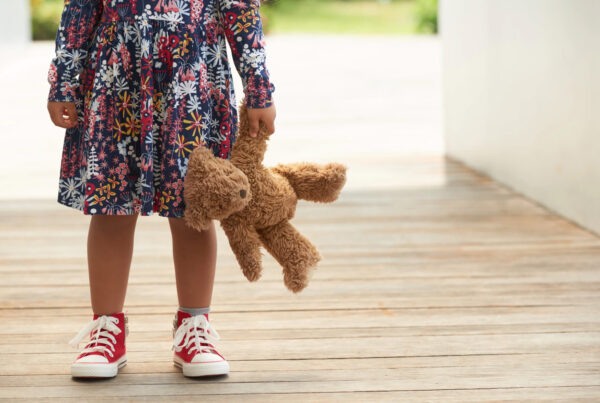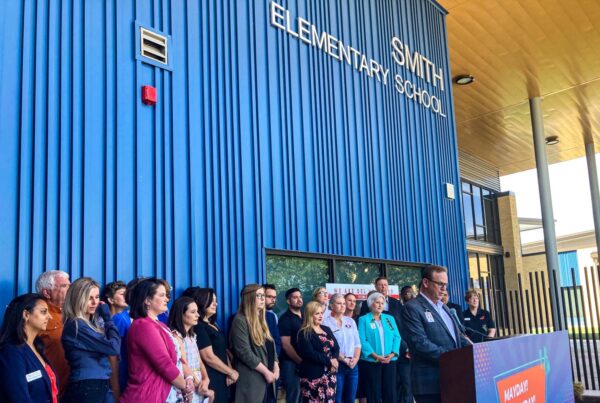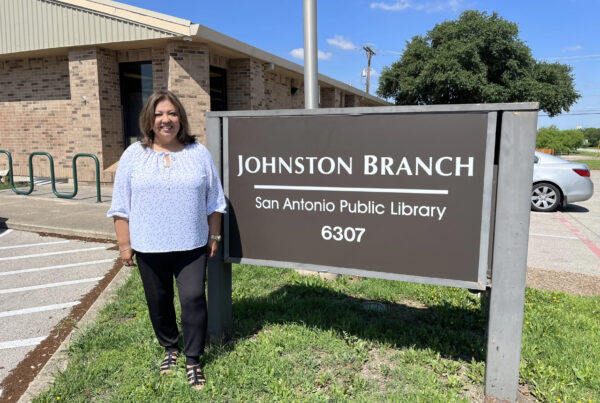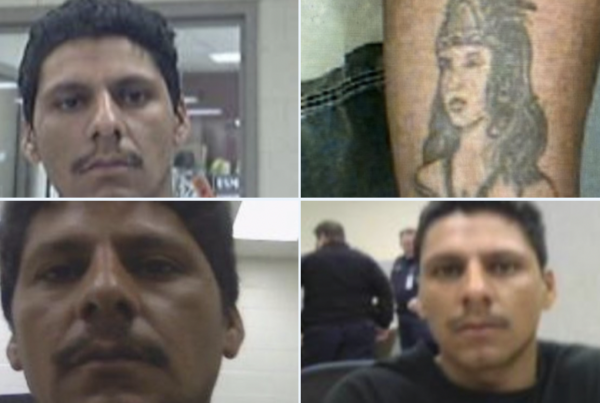At a small gym in North Austin, mixed in between the smells of sweat and the sounds of bags swinging, are people warming up.
There’s about 15 people of all different ages, physiques and identities lined up on the mat, ready to start training. Many are new at martial arts while others are seasoned fighters – but one mighty presence stands out.
Bug Lueckemeyer is the youngest and smallest person on the mat, but that didn’t stop them from joining in — and hitting hard. Lueckemeyer is 13 and had a lot of reasons for coming. One reason included being able to toss their friend around.
“My best friend, who’s like a head shorter than me, he was like, ‘I bet I can toss you over my shoulder’ and I was like, ‘I bet you can’t,’ and he did,” Bug said. “And it’s like, ‘Whoa, where’d you learn that?’ And then he was like, ‘Krav Maga. And so I was like, ‘I’ll get you back for this.’”
Bug’s mom, Jennifer Lueckemeyer, also participated in the class. Together, the Lueckemeyers and the rest of the participants shuffled around the mat, stretched their bodies, hit pads with their knees and learned how to “smash the patriarchy.”
“Smashing the patriarchy” is a key part of Lions Krav Maga’s LGBTQIA+ Self-Defense Seminar. The seminar aims to teach people several self-defense techniques and drills, like how to avoid getting grabbed or punched. Michaela Johnson, an assistant instructor at Lions who helps teach some of the seminars, said that since Krav Maga is a more practical form of martial arts, it allows the seminars to be frank about violence.
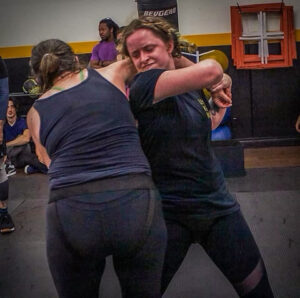
Michaela Johnson is an assistant instructor at Lions Krav Maga. Courtesy of Sabrina Jones
“It’s like a mish-mash of like wrestling and Brazilian jiu-jitsu and Taekwondo and Muay Thai… Like boxing and all of those other things,” Johnson said. “So it’s mostly just made to be extremely practical and on the side of certainly taking care of your own body and autonomy. So it’s very, very cool for that direction, like this contact version of self-protection.”
While Johnson said the seminars do include a lot of the traditional self-defense things like drills, kicks, punches and pad work, it’s also a lot of talking to each other.
“It is also working through the emotions. We don’t know what people walk into this building with, what kind of experiences and what kind of people that they know,” Johnson said. “And sometimes it’s working through the emotional part of realizing that you have no control over the situation, but that you deserve to be protected anyway.”
This seminar wasn’t the first time Lions has invited the LGBTQ+ community to learn about self-defense. Outside the gym, on the corner of a window, sits a rainbow badge-shaped decal sticker Lions earned from the Austin Police Department. That sticker, along with some training they did, legally designates Lions as a safe place for people of all races, identities and sexual orientations.
“Honestly, it’s just like a sticker on our window, right? We have to walk that walk. And there is not a place that I feel more safe probably than this building in a lot of ways,” Johnson said. “Like emotionally safe and also insanely physically safe.”
Since earning that sticker, Lions has hosted several seminars for different communities, including one for women and another one earlier this year for The Q Austin, a branch of Vivent Health dedicated to empowering queer people. Johnson said hosting seminars and donating the proceeds to local organizations is what’s important.
“That is like the kind of community building that matters and that spreads and helps people feel like they have allies, in the most literal sense, like literally people who would fight with you, you know, people that are going to be able to help you and protect you and help you know your worth,” Johnson said.
The seminar was about an hour and a half of punches, palm strikes, knees and fun music. It also included lots of partner work, drills and games that not only allowed people to connect with others in the class but to also have some fun doing it.
But despite the laughter and the pop music, the class still had a seriousness to it. Throughout the seminar, the music would stop and the laughs would fade while the instructor talked about calling 9-1-1 and how attackers are usually going to be bigger, better prepared and stronger than the participants.
“When someone attacks you, unfortunately, they are likely going to either be bigger, more prepared, have a weapon you don’t have, have a plan you don’t have and you’re scrambling to catch up,” the lead instructor said during class.
Johnson said that being able to talk about violence like this, helps people be better equipped to defend themselves.
“We are trying to acknowledge that this is not a game, right? Like this is something really serious and that it’s something that affects people all the time and that we’re practicing for like the worst day of your life,” Johnson said. “So when we’re training, it’s important to acknowledge the seriousness of it, I guess, while also understanding that we are in a safe space right now, right? Like right now you are working with people you trust, you’re working with instructors that you can trust and you’re working safely. So practicing the safe version of the thing that is not safe.”
She said for people who can’t hide their identity in public spaces, accepting that violence can happen can also make it easier to take up space in the world.
“For people who can’t avoid that attention, it becomes a lot scarier to be in those kinds of public places and being able to recognize a dangerous situation and get yourself out of it or do something about it before it gets worse is very important to those people,” Johnson said.
For the Lueckemeyers, the seminar wasn’t just a chance for them to exercise together or learn how to throw people around. It was a chance for both of them to feel powerful. Especially for Bug, who said the gym made them feel welcomed.
“It seemed really inclusive with the LGBTQIA+ and I identify that way, and I thought it would be really nice,” Bug said.
Plus, Bug said it didn’t hurt that The Q Austin gave out free goodies like buttons, pins and bags at the end of class.
“I also think it was really cool how they had like the tote bag thing in the front and they gave me a tote bag and I loved that,” Bug said.
But the more important reason Bug came was to learn how to take care of themself.
“I think that it’s really important to learn how to protect yourself, especially because the world is kind of getting, like, worse and worse in terms of that,” Bug said. “And even at just like my middle school, it can be very violent and there’s like lots of fights. And if something like that ever happened to me, I would want to be able to protect myself.”
Bug’s mom, Jennifer Lueckemeyer, said she came to the class to find her strength again, too, and she just really wanted to yell.
“I liked the yelling. I liked the just kind of aggression of it, because we don’t get to do that very often as women,” Jennifer said.
But more importantly, she said watching her kid hold their own in a space full of people who were bigger and older than them made Jennifer feel better about Bug navigating the world — even if it meant getting kicked around.
“Oh, I was so proud. [They] hit hard, really hard. And I was like, ‘Whoa, okay.’ There’s strength in there for sure. I had bruises for sure. I was really proud. And I saw [them] doing, you know, things with other people in the class,” Jennifer said. “And that felt great, just watching them buzz around and not be too afraid of being in [their] body and acting that way with people who are at least twice [their] weight, you know, or thereabouts.”
For the Lueckemeyers and everyone else that left the gym that Sunday, the class left them feeling a little bit sweatier, stronger and safer.


